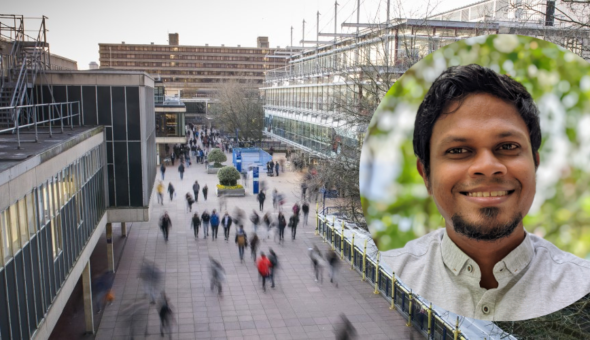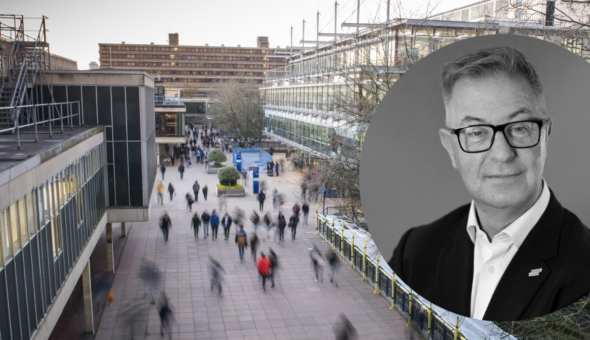After completing an undergraduate degree in chemistry, John Watkins continued his studies at Bath with a PhD. He then moved to the US, where he now works as Head of Materials at ESTAT Actuation. He shares his experiences of inspiring professors, start-ups and music by the lake.
 Why did you choose to study at Bath?
Why did you choose to study at Bath?
From the first time I visited the city when I was 10 or 11 years old, I knew I wanted to live there one day. That early exposure to the city, combined with my love of the small, intimate campus, beautiful scenery and excellent academic record in the sciences, meant Bath was a clear first choice when I was looking at prospective universities.
Did you have a particular career in mind when you chose to study chemistry?
Not a specific career, but I was always sure I would study a science or engineering degree. I even knew that I wanted a PhD when I found out it was the highest available qualification in the sciences. I chose chemistry in my final year of school, when I was lucky enough to have a very inspirational teacher whose passion for the subject was infectious. It seemed like the perfect mix of fundamental science and practical application of science.
As far as careers after my PhD, I never really thought about it until later in my time at Bath. As my studies became more advanced, I knew I wanted to be involved in creating products and solving problems, but really had no idea of the best way to make that happen.
Can you tell us about your experience of studying here? Any favourite memories, or places to go on campus and in the city?
So many of my favorite memories at the University centre around the wonderful scenery – especially the lake, where I’d regularly eat lunch. I was even lucky enough, as a sound engineer with [the student group] Backstage, to be a part of a live music event held in the amphitheatre on a beautiful summer day. We spent the morning setting up a speaker system then had an amazing open-mic afternoon hosted by MusicSoc.
Of course, I also spent many evenings during my PhD at the Parade Bar, talking ideas with other researchers and sharing some wonderful and much-needed downtime.
In the city I would regularly walk along the canal, around the city or down to Bathampton for a drink and pub lunch. I even once planned a whole day of canal walking from Bath to Bradford-on-Avon, had dinner and took the train home. The ability to get away from people and the busy city was the key to maintaining my mental and physical health.
Describe your career journey since graduating. What is a typical day like in your current role?
Since leaving Bath in 2012, the only thing I knew for sure was that I wanted to move to the US. Although I didn’t really think a career in academia was my final goal, an unmissable opportunity presented itself at Princeton University in New Jersey as a post-doctoral researcher in sustainable energy.
After working there for just over a year, a combination of uncertain funding and a new challenge at a US Department of Energy Lab caused me to move to Pittsburgh, Pennsylvania in 2013. After working in carbon dioxide capture for a couple of years, I – along with a small group of materials scientists at the lab – spun out a start-up company to commercialise a new coating for corrosion resistance. I started full-time with the new company, LumiShield Technologies, in 2016 as a co-founder and Head Scientist. I found it so rewarding to be a part of scaling our technology up to a 110-gallon pilot test in early 2020.
Unfortunately, a combination of the pandemic and lack of seed funding led to all staff being furloughed in the summer of 2021. At the time I was already consulting with another start-up, ESTAT Actuation, in the field of materials development for robotics. I joined the team full-time in September 2021 as Head of Materials, where I remain today.
There’s no typical day in a start-up, and that’s what I find most enjoyable about it. I have already been heavily involved in grant writing for government funding, mentoring students, drafting patents and discovering new materials. I also spend a good amount of time working with partner companies to test and develop new coatings, as well as continuing to work in our development lab.
How did your studies help you to develop?
My time at Bath was critical in shaping my love of science and the cross-cutting nature of different scientific and engineering disciplines. Throughout my undergraduate degree, professors infused even basic courses with their own interests and enthusiasm. As I matured throughout my degree, courses became deeper and more specific but maintained a lot of diversity, giving me access to a wide range of subjects.
I was also encouraged to spend summers working as an undergraduate researcher alongside PhD candidates. I later spent my MChem research time and even PhD in that same electrochemistry lab, under the mentorship of Professor Frank Marken.
My fascination with interdisciplinary science, which I learned at Bath, is what has guided my career.
What advice would you give to prospective students thinking about studying your course at Bath?
My biggest piece of advice is to keep your options as broad as possible, because very few people know what they really want to do next. This is certainly still true of me. After trying academia and government research, I fell into start-up culture by accident and have loved it ever since. It was certainly not my goal and I had never even heard of it as an option before.
I assumed that to work in such an environment you’d need a lot of business knowledge and the desire to be a CEO – this didn’t appeal to me at all. However, working with a small team, leading research and communicating new ideas is what I am passionate about now. My broad knowledge of many different aspects of chemistry has served me well in solving materials challenges using novel methods and abstract thinking.
Respond



